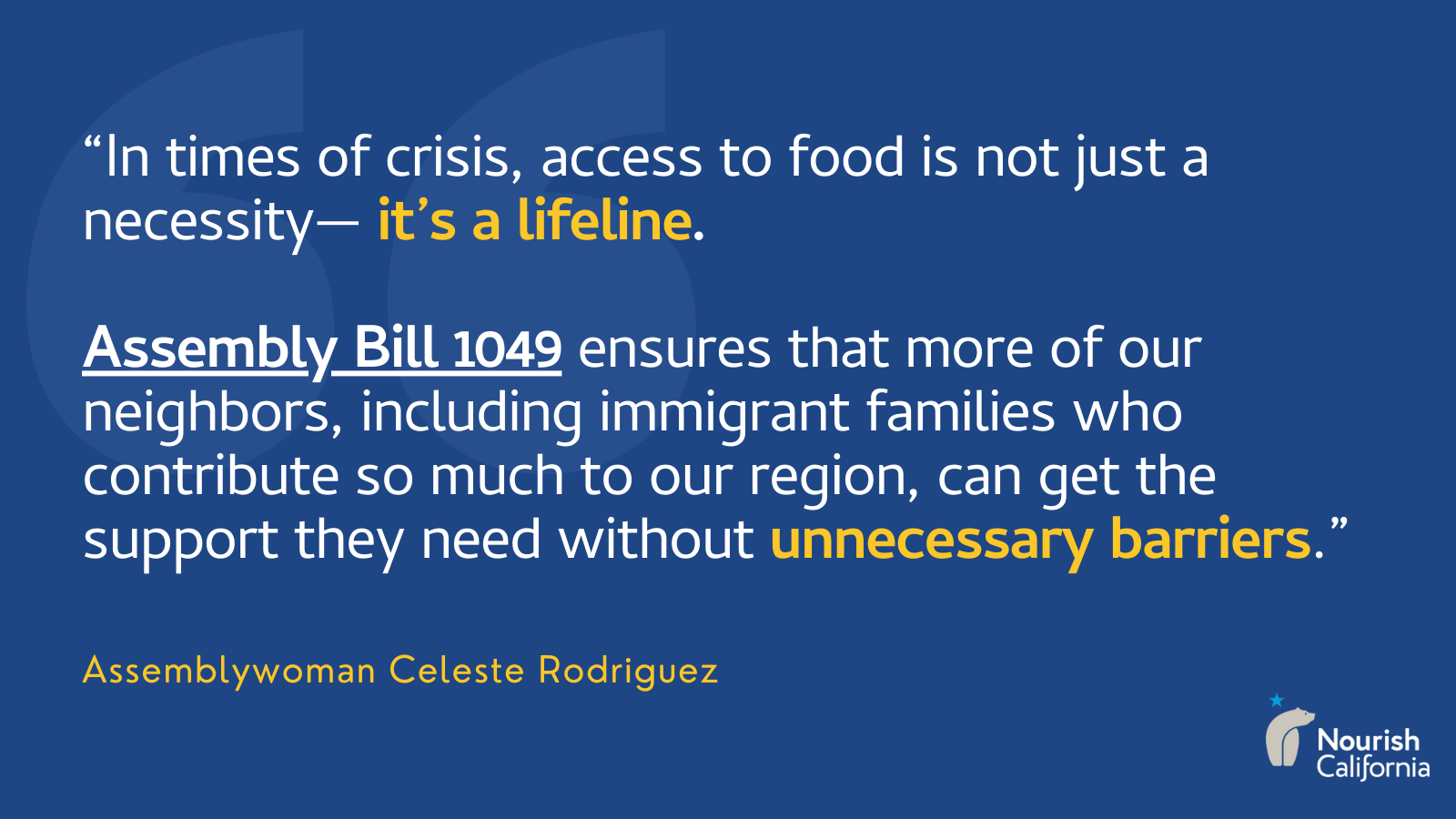FOR IMMEDIATE RELEASE
Media Contact:
Courtney Shojinaga, 213-204-3614, courtney@nourishca.org
Edward Sifuentes, 760-936-2632, esifuentes@caimmigrant.org
Sacramento (Feb. 20, 2025) - Assemblywoman Celeste Rodriguez introduced Assembly Bill 1049 today to improve food access and reduce food insecurity across California.
The bill seeks to remove a complicated rule in the eligibility determination process from the California Food Assistance Program (CFAP) called sponsor deeming. Sponsor deeming adds the income and resources of an immigrant’s sponsor when determining eligibility for benefits. This can cause confusion about eligibility during the enrollment process, making it harder for immigrant Californians to get the food they need. If they do seek food benefits, this rule causes low-income immigrant households to fear that their household or sponsor will experience negative consequences as a result. If passed, the bill would remove this requirement, streamlining the eligibility process, and strengthen our state’s food safety net to support Californians in times of economic hardship.
AB 1049 is part of the Food4All campaign, a movement to remove barriers to food assistance for all Californians, regardless of immigration status. Currently, CFAP provides state-funded food benefits to some non-citizens who do not qualify for federally funded CalFresh benefits. However, the federal sponsor deeming rule affects this state-funded program today and limits access to assistance.

In response to the introduction of AB 1049, members of the Food4All campaign and coalition issued the following statements:
Jackie Mendelson, Policy Advocate at Nourish California:
“Food4All means everyone has access to the food they need and want with no exceptions, no exclusions, and no delays – and this includes the removal of sponsor deeming from CFAP. Sponsor deeming is a complicated and unnecessary rule that causes additional barriers for families when they are most in need and seeking food benefits. By removing this rule and simplifying the enrollment process, California can honor its legacy of immigrant inclusion. We must continue to remove barriers to accessing the food we all need.”
Benyamin Chao, Health and Public Benefits Policy Manager with California Immigrant Policy Center:
“Assembly Bill 1049 is a crucial step toward ensuring that all Californians, regardless of immigration status, have access to the food they need to thrive. The federal sponsor deeming rule has long created unnecessary barriers for immigrants seeking food assistance, even in a state-funded program like CFAP. We will continue to advocate to strengthen our food security safety net and to meet the needs of all Californians.”
Assemblywoman Celeste Rodriguez, 43rd AD:
“Our communities have faced unprecedented challenges, from devastating wildfires to rising costs of living. In times of crisis, access to food is not just a necessity – it’s a lifeline. Assembly Bill 1049 ensures that more of our neighbors, including immigrant families who contribute so much to our region, can get the support they need without unnecessary barriers. I am proud to join the Food4All coalition to ensure no one in our state goes hungry.”
Lena Silver, Director of Policy and Administrative Advocacy at Neighborhood Legal Services of Los Angeles County
“Immigrant households eligible for CFAP/CalFresh face endless hurdles—language barriers, fear of public charge, stigma—that seriously suppress their enrollment into this crucial nutritional support. 2017 data shows that only 16% of eligible Mandarin speakers enrolled in CalFresh, and only 58% of eligible Spanish speakers. A big reason is fear and misunderstandings about sponsor deeming for green card holders. By removing sponsor deeming, which only lasts the first three years of LPR eligibility for CFAP anyway, immigrant households will have more meaningful access to the food benefits all low-income Californians need to be healthy and strong.”
AB 1049 is co-sponsored by Nourish California and the California Immigrant Policy Center, co-leads of the Food4All campaign. They launched the campaign in 2021 to end the exclusion of Californians from food assistance programs solely due to people’s immigration status. In addition to advancing AB 1049, Assemblywoman Rodriguez and Food4All advocates urge Gov. Gavin Newsom and the Legislature to protect the state’s commitment to expand CFAP to immigrants 55 and older by Oct. 1, 2027, and to expand food assistance to all Californians regardless of their age or immigration status.
The governor’s proposed 2025-26 budget protects the state’s previous historic commitment to expand access to food benefits to Californians ages 55 and older, regardless of immigration status. However, without additional action, hundreds of thousands of low-income Californians ages 0-54 will continue to be excluded from critical resources.
###
The Food4All coalition is a diverse, robust coalition of more than 100 anti-hunger, anti-poverty, immigrant rights, and grassroots organizations that are working together to bring an equitable food safety net that does not discriminate based on immigration status.
Founded in 1992 and operating for over a quarter century as California Food Policy Advocates, Nourish California is a nonpartisan, statewide 501(c)3 nonprofit organization. We engage in policy advocacy and research at the local, regional, and state levels in California and at the federal level. When our small team isn’t out meeting with communities, partners, and policymakers, we can be found in our offices in Oakland, Los Angeles (virtual), and San Diego (virtual).
The California Immigrant Policy Center (CIPC) is a statewide immigrant rights organization that advocates for policies that protect and advance the rights of immigrants and their families throughout California. CIPC combines legislative and policy advocacy, strategic communications, statewide organizing, and regional coalition capacity building to pursue its mission of advocating for policies that uphold the humanity of immigrants and refugees while advancing racial, social, and economic justice.




